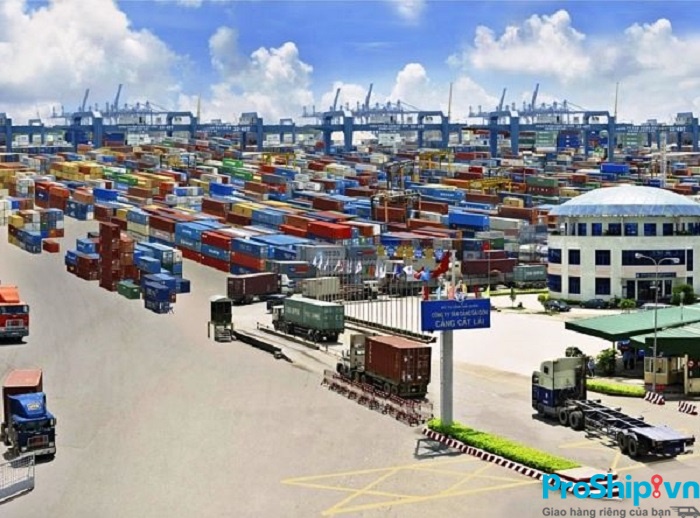Doanh nghiệp của bạn quan tâm đến khái niệm DEM là gì, DET là gì, phí Storage là gì? Bạn muốn làm rõ những điểm khác nhau giữa phí Storage & phí DEM, DET? Bạn chưa biết nguyên nhân vì sao Doanh nghiệp phải chịu khoản phí Storage, DEM & DET?
Những kiến thức liên quan đến khái niệm phí Storage là gì, DEM là gì, DET là gì, đặc điểm khác nhau giữa các khoản phí cũng như nguyên nhân phát sinh phí trong quá trình xuất-nhập khẩu hàng hóa tại cảng biển sẽ được Proship chỉ rõ qua bài chia sẻ bên dưới đây. Sau khi nghiên cứu, tìm đọc từng nội dung sau, tin chắc quý Doanh nghiệp sẽ biết cách phòng tránh hiệu quả để góp phần giảm thiểu chi phí, ngân sách trong suốt quá trình chuyển giao đơn hàng, kiện hàng.
XEM THÊM:
+ Vận tải container Bắc Nam
+ Dịch vụ kéo container
Phí Storage là phí gì?
Phí Storage là gì? Đây là phí lưu Container trong cảng, thường được dùng với từ phí lưu bãi. Phí lưu bãi này được hiểu là Container nằm trong cảng sẽ chiếm dụng một khoảng không gian của cảng nên sẽ bị mất phí này. Nó thường bị nhầm lẫn với phí DEM. Phí này mặc định bắt đầu tính sau 3 hoặc 5 ngày và thường rất thấp. Phí này thường không có khung giá, nó được tính theo ngày và một đơn giá.

Ví dụ: 2USD/days, Container nằm trong cảng 10 ngày, được miễn 3 ngày. Vậy tổng phí là: 7*2=14 USD.
Nhiều khi hãng tàu sẽ thu 2 hóa đơn và đều ghi là phí lưu bãi nhưng giá hóa đơn lại khác nhau nên xảy ra nhầm lẫn. Thậm chí, nhiều người nghĩ là đã đóng phí DEM rồi nhưng thực chất đó chỉ là phí Storage. Do đó, khi đi lấy D/O, cần phải kiểm tra DEM được bao nhiêu ngày để tránh những nhầm lẫn không đáng có.
Trường hợp hàng xuất, nếu hạ bãi quá sớm so với Booking thì có thể sẽ bị charge phí này. Nhiều trường hợp có hãng tàu thu hoặc có thể cảng thu, việc này thì phải tùy vào thỏa thuận của cảng và hãng tàu. Về phần cảng thu thì thường có thu cùng phí quá hạn bãi kiểm hóa, đây cũng là phí lưu bãi, nhưng mà phí lưu bãi trong bãi Container có dịch vụ đặc biệt (kiểm hóa) thì cảng sẽ thu.
Trong một số trường hợp (không phải hầu hết) có thể phát sinh thêm phí Storage Charge, cảng sẽ thu trực tiếp chủ hàng (khác với DEM & DET – khách hàng đóng cho hãng tàu), phí Storage Charge có liên quan chặt chẽ đến phí DEM.
Tìm hiểu những điểm khác nhau giữa phí Storage & phí DEM, DET
Giữa phí Storage & phí DEM, DET với những điểm khác nhau được chỉ ra như sau:
Phí Storage
Phí này thường hay bị nhầm lẫn với phí DEM, được tách ra từ phí DEM. Phí này cũng là phí lưu bãi nhưng do chủ hàng đóng cho cảng mà không phải hãng tàu.
Lấy ví dụ: Nếu kiện hàng của bạn được nhập khẩu vào Cảng Cát Lái. Hãng tàu miễn phí cho bạn DEM 5 ngày. Sau đó, vì lý do gì đó đã quá 5 ngày mà không đến nhận hàng kịp, hàng được lưu tại bãi của hãng tàu và phải trả phí DEM cho những ngày sau đó. Tiếp theo, nếu bạn kéo hàng về kho để làm hàng, quá trình làm hàng mất thời gian hơn thời gian quy định phải trả Container cho hãng tàu. Lúc đó, bạn phải trả phí DET và phí Storage cho cảng.

Phí DEM
DEM là gì? Phí DEM là phí lưu Container tại bãi mà hãng tàu thu khách hàng. Bản chất của nó là cảng sẽ thu của hãng tàu, sau đó hãng tàu sẽ thu khách hàng và đóng lại cho cảng theo thỏa thuận riêng, được tính trên mỗi đơn vị Container.
- Với hàng nhập: Sau khi hàng hóa được thông quan nhập khẩu sẽ được hãng tàu dỡ xuống và lưu tại bãi container của mình. Lúc này, hãng tàu gửi D/O – giấy thông báo hàng đến cho người nhận, có thể là chủ hàng hoặc Forwarder. Trong thời hạn nhất định, thường là 1-7 ngày với Container khô và 1-3 ngày với Container lạnh thì không phải trả phí lưu bãi nhưng nếu vượt quá thời gian này, chủ hàng sẽ phải trả phí DEM cho hãng tàu. Phí này được tính theo đơn vị Tiền/ngày/container.
- Với hàng xuất: Sau khi nhận được Booking Confirmation của hãng tàu. Khách hàng căn cứ vào thời gian xuất hàng để kéo hàng lên Cảng. Thời gian này thường trước 1-7 ngày với Container khô và 1-3 ngày với Container lạnh. Nếu bạn kéo hàng đến cảng trước thời gian này thì phải trả phí DEM cho hãng tàu. Thông thường, chủ hàng sẽ hạn chế được phí này khi xuất khẩu vì giao hàng trong thời gian quy định.
Phí DET
DET là gì? Phí DET là phí lưu Container tại kho, được đóng cho hãng tàu và tính theo ngày & tùy thuộc vào kích thước, chủng loại Container trong vận chuyển hàng hóa đường biển.
- Với hàng nhập: Nếu bạn trả Container rỗng trễ hơn so với giờ Closing time. Container này sẽ được lưu ở kho của bạn và hãng tàu sẽ bắt đầu tính phí DET
- Với hàng xuất: Phí này được tính khi bạn lấy Container sớm hơn so với ngày cho phép lấy Container.
Nguyên nhân khiến Doanh nghiệp phải chịu phí DEM/DET/STORAGE
Những nguyên nhân khiến các Doanh nghiệp phải chịu phí DEM/DET/Storage được chỉ ra như sau:
Khai báo Hải quan và làm hàng chậm trễ
Nhiều đơn vị không lường trước được những việc phải làm nên khá chủ quan hoặc chưa có nhiều kinh nghiệm nên thực hiện mọi thủ tục khá chậm trễ, làm chậm thời gian và phát sinh nhiều khoản phí không đáng có
Trễ chứng từ
Các chứng từ rất cần có cho việc thông quan nhưng lại làm trễ làm kéo dài thời gian và phát sinh chi phí ngoài mong đợi
Lỗi chứng từ
Một trong các chứng từ nộp Hải quan bị sai sót các thông tin về tàu bè, địa chỉ,…bị Hải quan yêu cầu sửa đổi. Điều này làm mất thời gian và hàng hóa bị lưu kho ở bãi đến khi chỉnh sửa thông tin chính xác
Mất chứng từ
Vấn đề này thường xảy ra, có thể là do mất chứng từ trong vận chuyển hoặc quản lý hồ sơ không chặt chẽ, nhất là nếu mất vận đơn sẽ tốn nhiều thời gian để lấy lại.

Những kiến thức liên quan đến phí Storage là gì, DEM, DET là gì? Và điểm khác nhau giữa các loại phí, nguyên nhân phát sinh phí mà Proship vừa chia sẻ, quý Doanh nghiệp nào đang có nhu cầu muốn tìm hiểu một số phụ phí phát sinh ngoài mong đợi có thể tham khảo, phòng tránh hiệu quả nhằm giảm thiểu chi phí cho đơn vị kinh doanh hàng hóa XNK của mình…Và khi bạn muốn tìm kiếm Dịch vụ vận chuyển, bốc dỡ, XNK hàng hóa đường biển giá rẻ, chuyên nghiệp, liên hệ qua hotline 0909 344 247 để được hỗ trợ, báo giá.
📦 Hotline Liên Hệ Vận Chuyển
🧭 Miền Trung

